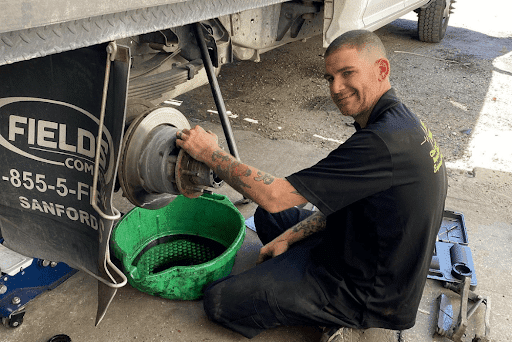
Managing a fleet of vehicles is no small task. Whether your fleet consists of delivery vans, service trucks, or company cars, keeping every vehicle in top condition is essential for maintaining safety, productivity, and cost-efficiency. A solid fleet preventative maintenance plan can help you optimize your fleet’s performance, minimize downtime, and maximize the life of your vehicles.
At Griffis Automotive Repair, we specialize in fleet services and offer comprehensive solutions to ensure your vehicles stay road-ready. In this post, we’ll cover the importance of fleet repair, provide key fleet management tips, and outline a preventative maintenance plan to keep your vehicles running smoothly.
Preventative maintenance is a proactive approach to vehicle care. Rather than waiting for something to go wrong, you schedule regular inspections and service to prevent issues from arising. This routine care includes oil changes, tire rotations, brake checks, and fluid top-offs—all designed to catch problems before they cause serious damage or downtime.
For fleet optimization, a preventative maintenance program helps reduce unexpected repairs and ensures your commercial vehicles are always in top shape. This means less time off the road and more time spent focusing on your business.
Breakdowns can be costly, especially when they happen unexpectedly. Routine maintenance minimizes the risk of vehicle failure, ensuring your fleet stays operational. By regularly checking critical systems like brakes, engine performance, and electrical components, we can address potential problems before they become expensive repairs.
A well-maintained vehicle is a safer vehicle. Whether you’re managing a single vehicle or a large fleet, the safety of your drivers and passengers is paramount. Fleet services like brake checks, tire inspections, and alignment services help ensure each vehicle operates safely. Regular inspections help identify worn-out parts or systems that could lead to dangerous driving conditions if left unchecked.
Regular maintenance not only prevents breakdowns but also helps extend the lifespan of your vehicles. Over time, routine upkeep—like oil changes and replacing air filters—can make a significant difference in how long your vehicles remain in service. Fleet management is all about maximizing your investment, and taking care of your vehicles through preventative maintenance does just that.
Proactive vehicle upkeep is always less expensive than dealing with a major repair after a breakdown. When you schedule regular fleet maintenance, you’re able to catch small problems early, saving on expensive repairs and avoiding the need for vehicle replacements sooner than expected. Additionally, a well-maintained fleet operates more efficiently, leading to savings on fuel and other operational costs.
To optimize your fleet performance, every commercial vehicle needs to be on a regular maintenance schedule. Here’s a breakdown of the essential elements to include in a preventative maintenance program:
The foundation of any fleet management program is consistent vehicle inspections. By scheduling frequent checks, you can monitor critical vehicle systems such as:
These inspections should be performed by ASE-certified technicians to ensure that every vehicle is safe and ready for the road.
Certain maintenance tasks should be scheduled based on the vehicle’s mileage or usage. These include:
Working with an experienced fleet repair shop like Griffis Automotive Repair ensures that these tasks are done on time and with the highest quality parts.
At Griffis Automotive Repair, we offer digital vehicle inspections as part of our fleet services. This technology allows you to see exactly what’s going on with each vehicle in your fleet. From detailed reports to real-time photos and videos of problem areas, you’ll have a clear understanding of what’s needed to keep your fleet running at its best.
A key component of fleet optimization is keeping detailed maintenance records. By tracking each vehicle’s service history, you can make informed decisions about repairs, replacements, and when it’s time to retire a vehicle from the fleet. Good record-keeping also helps identify patterns—like repeated issues with certain vehicles—that can be addressed to improve overall fleet performance.
Creating a preventative maintenance plan for your fleet doesn’t have to be overwhelming. Start by working with a trusted fleet repair shop like Griffis Automotive Repair. Our ASE-certified technicians have experience with all types of commercial vehicles, and we can help you develop a maintenance schedule that fits the needs of your business.
We recommend setting up a meeting with our team to discuss your fleet’s unique needs. During this consultation, we’ll help you:
In addition to regular maintenance, educating your drivers on best practices for vehicle care is crucial. Simple habits like checking tire pressure, monitoring fluid levels, and reporting unusual vehicle noises or behavior can make a huge difference in preventing breakdowns.
Keeping your fleet in top condition is essential for running a smooth operation, and preventative maintenance is the key to ensuring your vehicles remain reliable and efficient. At Griffis Automotive Repair, we offer specialized fleet services designed to optimize your fleet’s performance and minimize downtime. Our ASE-certified technicians provide comprehensive fleet repair and maintenance solutions tailored to your specific needs. Visit us at 1400 S. Bumby Ave., Orlando, FL, or call (407) 896-2225. You can also visit our website at https://griffisautomotiverepair.com to schedule your fleet’s preventative maintenance and keep your vehicles operating at their best.